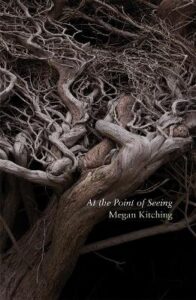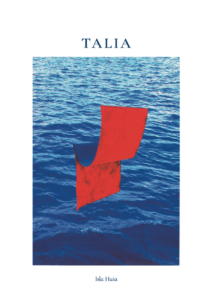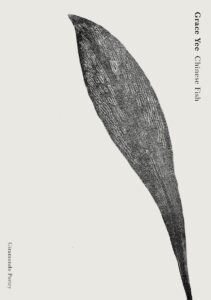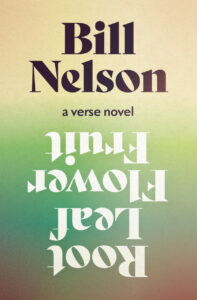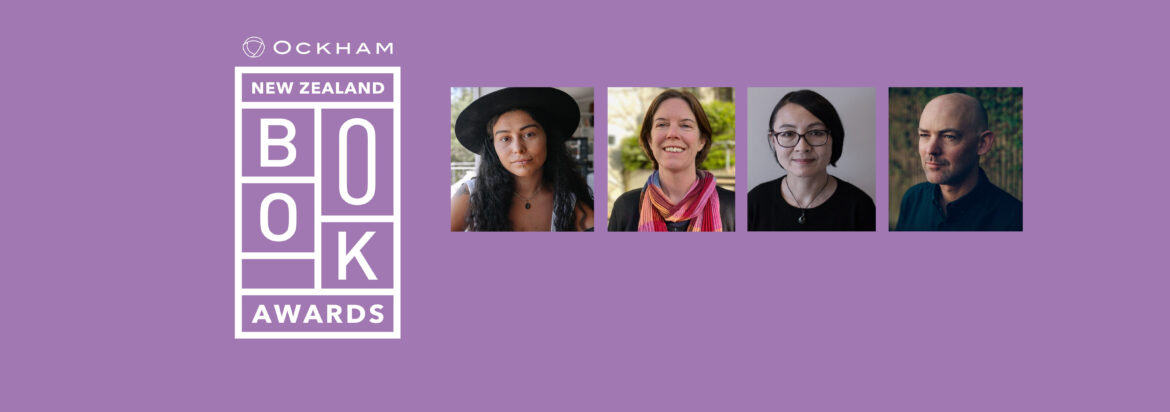
Ockham NZ Book Awards: Poetry Round Table 2024
The finalists in the Mary and Peter Biggs Award for Poetry are Talia by Isla Huia, At the Point of Seeing by Megan Kitching, Root Leaf Flower Fruit by Bill Nelson, and Chinese Fish by Grace Yee. Nelson’s book is his second; the other collections in this list are all debuts.
Erik Kennedy, convenor of this year’s poetry judges at the Ockham NZ Book Awards, says the finalists’ books ‘blur genres and disrupt preconceptions of poetic form, they re-vision landscapes and histories, and they deploy languages other than English in distinct ways that encourage multiplicity.’
Talia by Isla Huia (Te Āti Haunui a-Pāpārangi, Uenuku) is a tribute to the poet’s late friend, the artist Natalia Saegusa. ‘Natalia’s artwork graces the cover and reflections on her passage from friend to ancestor reappear throughout the book, ‘ writes Erena Shingade on Reading Room. ‘The voice of the poet is clear-eyed and thoughtful as the text explores belonging and loss.’
Linda Collins, reviewing At the Point of Seeing for the Aotearoa NZ Review of Books, praises Megan Kitching’s ‘tenderly written, quietly powerful debut collection’ for its ‘contrast, wordplay, rhythm, and variations in form’ and exploration of ‘the complex inter-relationships between the environment and people’.
Bill Nelson’s verse novel Root Leaf Flower Fruit ‘draws us deep into the heart of experience,’ Paula Green writes on NZ Poetry Shelf, ‘ fracturing and continuous, observational and reflective, imagined and lived, so utterly refreshing the page of being human.’
Chinese Fish by Grace Yee is also a verse novel: it won both the poetry prize and Victorian Prize for Literature at this year’s Victorian Premier’s Literary Awards. Chinese Fish explores the lives of various generations of a Hong Kong family who emigrate to Aotearoa New Zealand. The VPLA judges praised the way Yee ‘switches between lyric, dramatic and documentary poetic form’ and ‘tells this story with sparkling humour, wit and stylistic verve’.
This virtual conversation took place in late April and early May, with Grace in Melbourne, Isla in Ōtautahi / Christchurch, Megan in Ōtepoti / Dunedin, and Bill in Te Whanganui-a-tara / Wellington. Paula Morris (in Tāmaki Makaurau / Auckland) asked occasional questions.
Paula: Three of you are shortlisted for your debut collections. For each of you, does your book represent the culmination of a long period of work? Where does it fit with what you’ve written (and/or published, possibly in another genre) before?
Grace: I wrote the first draft of the book for my creative writing PhD about settler Chinese women’s storytelling in Aotearoa, so the poems were very much inspired by the critical research. It took maybe 12–18 months to complete the first draft. After I graduated in 2016, I didn’t seriously consider submitting the manuscript anywhere. Because it’s so experimental and eclectic, I assumed that no publisher would be interested, so I let it sit for a while.
Then in 2020 I applied for the Peter Steele Poetry Award, and that motivated me to re-work the manuscript over a few months. But in the years the story sat in the top drawer I was still thinking about it – the characters, the histories: they all simmered on the backburner. When the time came to put pen to paper again, I found I had a pretty good sense of how it needed to evolve, how it could be cut and sharpened and rearranged. I feel like I held and nurtured Chinese Fish for a long time, even though not all of that time was spent actively working on it. Since 2019 I’ve been working on my second collection, which is inspired by the histories of settler Chinese in Australia, so the research and drafting of these poems informed my revisions of Chinese Fish.
Bill: I started working on Root Leaf Flower Fruit in about 2017 after I had an accident that resulted in a bad concussion. I wanted to write about the weirdness of the whole experience, but it was a really difficult thing to get into and it took me a long time to find the right way to approach it. There were several false starts, and a classic lyric poem or two that did a reasonable job but didn’t quite go deep enough. To be honest though, even when I sent it off to the publisher I was still sceptical that it was even readable let alone something that would end up being published.
But also, I’m stoked that there are three debut collections here! That’s incredible and amazing that you’ve all written such accomplished material on your first go! My debut book was both naive and too wise, too overworked and too loose, too scary and a bit safe all at the same time. It was good to get that out of the way. Also, I’ve noticed people who do creative writing PhDs always write amazing books out of it. I really hope creative writing PhDs keep going as long as possible.
Megan: Yes, it’s a lovely surprise to see so many debuts on the list. I’m honoured to be in the company of all of you! My collection is a culmination in retrospect, in that I didn’t set out to write a book. I started working more seriously on poetry when I moved back to Dunedin in 2017. Most of the poems in At the Point of Seeing were written from 2020 on. It took time to build up a body of work, and—to be honest—to find the confidence to believe that publishing a collection was possible. I’d published a little academic writing, and there are some echoes of that in my poetry. What I’ve read in other fields and genres has definitely been the biggest nourishment for my creative work.
Isla: Talia is absolutely a culmination of a long period of work, because like Megan, I never set out to write a book. I collected poems and snippets of ideas and thoughts across the span of around a decade, including some poems that I used in spoken word competitions and wrote for different journals and events, and then in the end, those old pieces became a really large part of what makes up the book.
At the same time though, the connection with my publishers and the offer of publication came at a time when I was using writing as a means by which to process the death of my dearest friend (the book’s namesake), and so the other crucial element of the book is that particular selection of poems, and that underlying kaupapa (which now feels like the backbone of the book). I had only a few months between meeting the publishers and the manuscript deadline date, and so Talia feels like a very equal mixture of old work re-edited and re-ignited, and very new, quickly written work that speaks so clearly to what was happening in the year I wrote it and who I was.
Grace: I think experiencing the death of someone close can sometimes bring elements of your work into sharp relief. In 2021 my father passed away suddenly while I was revising Chinese Fish to submit to publishers, and the manuscript for months afterwards felt like a whetstone for all the grief I was processing. My long-term memories of him became so much clearer, and I ended up incorporating some of the details from those memories into the book. I recall sitting at my laptop revising poems and sobbing! It was a strange time – very painful yet productive.
Paula: Would you all talk about your approach to form in your work, and how you decide on or arrive at a form that suits a particular poem or sequence?
Megan: I love form! It’s one of the great drivers of my love of poetry – the possibilities are so exciting, and it’s such a beautiful tight-rope walk balancing those wide-open options with constraints. My feeling for form is quite physical, as if I’m making something with my hands.
Buckminster Fuller has a term I like to borrow when thinking about poetic form: ‘tensegrity’, a portmanteau of ‘tensional’ and ‘integrity’. There needs to be some tension in the lines or shape of the poem that’s holding it together with just the right amount of pressure or lightness that it stays true to its subject or heart. That’s the ‘integrity’ part, which for me means that the form shouldn’t distort or overwhelm what the poem is really getting at.
I’m naturally drawn to more regular forms, so I tend to edit back towards whatever shape a poem is taking, no matter how loose the first attempts might be. Sometimes I decide in advance what I think will suit the poem best but more usually it comes out of the process of drafting and playing around on the page and screen.
‘Herb Robert Sonnet’, just as an example, wasn’t originally in that form, but the plant and its folklore had so much energy that I wanted the challenge of trying to wrangle all that into 14 lines. There’s so much craft that goes into the more established forms like sonnets. That’s exciting but daunting to me—to have to think so hard about each word, weigh each element.
Of course, I look a lot at what other poets are doing, often as a way of pushing myself to try something new. There’s so much fresh and experimental work out there that I admire, but that feels very much beyond me at the moment. I do try to vary the shapes and forms I use. It’s a learning process, and extremely fun.
Grace: I find that decisions about form usually involve a lot of play and experimentation, and are not only intimately tied to content, but voice and scene or situation. In Chinese Fish, the different narrators’ poems take on different forms – for example, the narrow poems portray the Chinese woman character Ping’s habit of self-minimising in public spaces, and the italics emphasise the significance that it’s remarkable that she gets to speak at all; Cherry’s intrusions into the omniscient narrative are protected with well-spaced brackets; and there are numerous conversation poems set out as dialogues.
In other standalone poems, I do still find the main deciding factors are voice and pace and rhythm: reading drafts out loud helps me to figure out where the line breaks and pauses go – if there are any. I work with traditional forms only very occasionally, and then often only using them as scaffolds in early drafts. I find that the form of a poem needs to evolve organically.
Isla: I’d say I’m a bit like you, Grace, in that the form of my poems definitely seems to develop somewhat organically. Although I want my poems to be multifaceted in how they’re interpreted by the reader, there’s definitely an element of wanting to help the reader navigate and understand the piece through the form as well. It feels like I’m giving them little hints: pause here, stop here, etc.
Sometimes I find that I can’t even explain why I’ve chosen a particular layout, other than that it feels like the only natural way for the poem to be put out into the world. In saying that though, I definitely resonate with Megan too, in that I’m constantly inspired by the way different writers play with form and that definitely influences me to try to be a little more experimental as well.
Bill: It’s never quite the same twice, but I’d say in general the form is possibly the most important thing for me and it’s one of the exciting things about writing poetry instead of prose. I find the form often drives the rhythm, the voice and the visual tone of the poem, and like the others said, happens organically. It rarely arrives from the first line, although sometimes after a couple of stanzas it seems pretty locked in. For some reason I often end up writing in four line stanzas and I don’t really know why. I certainly find myself resisting that urge. And then eventually the poem wins out and I give in.
Paula: Poetry – like all art – has the ability to provoke, confront and unsettle. As you know, a political party here has led an attack on a poem and its writer, leading to abuse on social media, threats to the writer and (unsuccessful) complaints to the Media Council. What do you see as subversive and/or unsettling in your own work?
Bill: Firstly, my heart goes out to anyone who has to deal with that kind of vitriol. It makes me sad that excellent poetry about an important issue is used for political mis-information. That sucks.
As for my own book, I don’t think it’s very politically subversive, although some people might find parts of it challenging. One reader said it was a ‘commentary on the ways in which Pākehā reach for connection to place and people but sometimes miss’. Which I love but wasn’t something I was consciously doing. I do like to mess with expectations of what a poem is, or can be, although I tend to think of that as a bit of fun more than anything subversive.
Megan: Bill, I also love that commentary on Root Leaf Flower Fruit – it’s very much what I felt too as a Pākehā reader of the book. I don’t think my work is subversive in a political sense, either. At least, like Bill, I don’t consciously set out to provoke or challenge readers. I was intrigued that the Ockhams shortlist blurb for my book mentions ‘difficult social and political questions’, and it’s true that issues like climate change, environmental degradation and colonisation are present in many poems. It’s also true that there are more brilliant, outspoken poets out there tackling these questions full on. I think that, if my work is unsettling, it’s probably in a quieter way.
Bill: Yes. I feel the same way about others addressing any particular issue better than me. One thing I was thinking about while answering this question is that, whether someone is challenged or even provoked by something is completely dependent on them. One person’s conservative viewpoint is another’s extreme position. It’s hard to predict how anyone will take your work.
Grace: I don’t see my book as unsettling or subversive – at least I didn’t intend it to be. I didn’t self-censor the writing much, though. I didn’t think Chinese Fish would be published, felt I had nothing to lose, so wrote it very much for myself. The book has been variously described to me as ‘confronting’, ‘triggering’, and ‘provocative’ (among other things), and some readers have felt ‘unsettled’ by what they perceive as the characters’ ‘unsafe’ lives (!) These comments have come from readers across the board: from the white mainstream, as well as diverse ‘minorities’.
But I think ‘unsettling’ is a good thing for poetry – or any writing – to be; it means it’s had an impact. One of my favourite reviews is a conversation about Chinese Fish by two white men – both poets, who talked about how and why they were so unsettled by the book, how they saw parts of it as a mirror. I admire that they had the courage to reflect on themselves and articulate their vulnerabilities on the page. ‘Unsettling’ is good!
Isla: Knowing the author you’re talking about, Paula, and listening to her personal experience, has been both a scary reminder to me of the backlash that can come from people who feel like your work is targeting them unjustly, and a beautiful reminder of why we have to say what must be said regardless. I see my work as unsettling in the sense that I like to write in a way where the bones are bare, and I often find that the kaupapa I’m compelled to write about most often are those that have the ability to create discomfort.
I feel courageous enough to write these things down, to publish them and to share them; but I do find myself censoring my choice of poems when it comes to reading aloud at events. The lack of fear I have about putting pen to paper and talking about colonisation, or mental health, or death – that doesn’t always translate into being brave enough to make my audience uncomfortable, even if I believe it’s important for them to feel those things.
Paula: A final question. If you had to choose one poem from your book that you’d like someone to read (someone coming fresh to your work, knowing nothing about it), what would that poem be and why? And if you could ask that person to read a poem by another writer you admire, which poem and which writer?
Megan: This is a tricky question! From At the Point of Seeing, I’d pick ‘A Bee Against a Window’, because I think it manages to get close enough to its subject to capture the character and perhaps even some of the lifeworld of a non-human being. It’s also a poem about the persistence of nature. Then I’d urge them to read Sue Wootton’s spectacular ‘Ōwheo’, which is a beautiful, skilful, living evocation of an entire river ecosystem – a paean to place that reminds us of our connections to the earth and waters.
Bill: I love the extreme closeup scrutiny in that poem, Megan. It’s the little things that often draw me in to poems and your poem does that so well. My book is a verse novel, so obviously you have to read the whole thing from start to finish. But if you were short on time I’d recommend the first few pages, or the part where the main character has to figure out how to jumpstart a tractor.
And a good poem after that would be ‘Date line’ by Morgan Bach. It’s so intensely written it feels like it’s burned into the page.
Grace: Bill, I agree you do need to read your whole book from start to finish – I’ve read it and once I started, I couldn’t put it down, you get caught up in the rip of the story! I read it so fast, I will need to read it again, more slowly. My book is also a verse novel, and I don’t think I could extract one poem from it. Perhaps the short sequence of post-wedding poems on pp 102–3, because these three brief poems juxtapose many of the story’s multiple voices and portray many of the book’s themes and tensions – mother-daughter, pressures to assimilate, orientalist attitudes – yet ends on a ‘triumphant’ note in the voice of one of the female protagonists.
I don’t think I could recommend one poem by another poet. What I enjoy most is reading poems as parts of narratives – i.e., verse novels, or cohesive collections. I highly recommend Bhanu Kapil’s Incubation: A Space for Monsters, which is about a woman who hitchhikes across America. Anything by Bhanu Kapil is brilliant and utterly captivating.
Isla: Probably ‘Karakia’ – simply because it covers so many of the kaupapa that exist throughout the book, but all at once. I think that of all of the poems in Talia, it represents the book as a whole the best, and also represents me as a writer most accurately and honestly.
I would urge anyone who hasn’t already done so to delve into Hone Tūwhare’s work. His writing has been so formative for me as a kaituhi Māori, and for Aotearoa as a whole in regards to our collective ability to be a good audience, and good listeners, to Māori voices. My favourite poem of his – and of all time – is Haiku (1):
Stop your snivelling creek bed,
Come rain, hail and floodwater,
Laugh again.
.
The Ockham NZ Book Awards take place on Wednesday 15 May in the Kiri Te Kanawa Theatre, Aotea Centre, Auckland. The event starts at 7 PM. You can buy tickets here or watch a livestream of the ceremony on YouTube.
'I started to feel very guilty, as though I’d perpetrated a crime, a rort' - Stephanie Johnson

